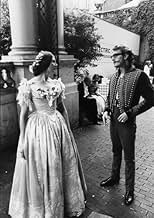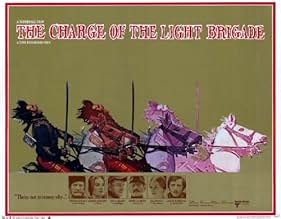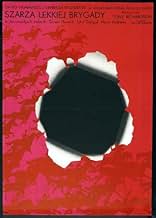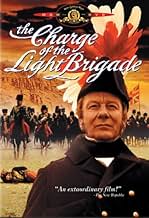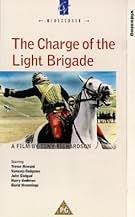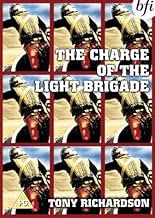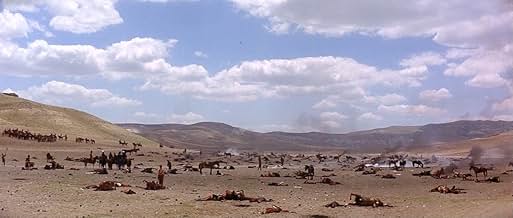IMDb रेटिंग
6.6/10
4.2 हज़ार
आपकी रेटिंग
अपनी भाषा में प्लॉट जोड़ेंIn 1854, during the Crimean War, poor planning leads to the British Light Brigade openly charging a Russian artillery position with tragic consequences.In 1854, during the Crimean War, poor planning leads to the British Light Brigade openly charging a Russian artillery position with tragic consequences.In 1854, during the Crimean War, poor planning leads to the British Light Brigade openly charging a Russian artillery position with tragic consequences.
- निर्देशक
- लेखक
- स्टार
- 7 BAFTA अवार्ड के लिए नामांकित
- 7 कुल नामांकन
John J. Carney
- Trooper Mitchell
- (as John Carney)
Howard Marion-Crawford
- Lt. Gen. Sir George Brown
- (as Howard Marion Crawford)
Christopher Cunningham
- Farrier
- (as Chris Cunningham)
फ़ीचर्ड समीक्षाएं
Russia has invaded Turkey, much to the chagrin of the British, who sees this as a threat to their dominance of the globe through their Empire. As the politicians debate a course of action, the military prepare for war, recruiting men from the working classes and officers from the ruling classes. One such officer is Captain Louis Nolan, who comes under the charge of Lord Cardigan one of the old guard and a cantankerous, arrogant leader to boot. This form of leadership feeds through his officers and brings conflict with the straight approach of Nolan. This conflict reaches The Times and enrages Nolan, who continues his arrogance even as the Light Brigade join the forces heading through Turkey.
With stories of all manner of goings-on during the three year production of this film it is little wonder that in some regards this film is all over the place. I am unsure of the historical value of the writing but it doesn't manage to do much in regards characters or consistent tone (either in the film or the individuals). Nolan is a fine example of this as he never manages to be an engaging character and, along with the rest of them, just comes off as larger than life characters seemingly without any significant basing in reality. This makes it hard to get into as it seem to jump around in narrative without any real drive. This is all the more frustrating because on the edges it does do some things pretty well. From the very start there is a clear judgment on the English mentality the world policeman, the mighty lion, the posh officer mindset of war as a sort of game and so on. This is backed up pretty much by the rest of the film, which spends more time on this than on the characters, and it is interesting although maybe not enough to base a whole film on the animations alone are sharp enough to suffice if contrasted well with a reality.
The film may also be of interest recently because the most obvious parallel is now with the US's position in the world not quite an Empire but certainly with all the influence and invincibility that GB once believed it had. It is also relevant because it highlights the horrors of war and, even without characters we care about, the final charge is a mess of death that lacks any of the honour or beauty that the hillside generals talk of minutes before. Sadly all this is wasted in a messy film that cannot seem to get an even tone is Cardigan a worthless leader or a comedy character? Are we meant to enjoy the battles or be horrified by them? And what's to be made of Nolan's constant preachy dialogue alongside scenes of comic value? These major problems take away so very much from the film that it is hard to really stick with it and see what little good there is. The cast is made up of every British actor from the period who was between the age of 30 and 60. OK, maybe that is an exaggeration but at times it would have been easy for me to believe that. Hemming plays his character far too solemn and serious a problem when it makes his already poor dialogue sound like the ramblings of a pretentious fool. Howard has fun in his role but his is an one note performance that gets too close to a send up and confuses the tone of the film somewhat. Gielgud is good because he shows the same faults as Howard's character but does it without the overblown blustering. The support cast is made up of many British actors from the period but, without the material, many of them come and go without anything of value to add.
Overall this should have been a much more interesting and engaging film but it blows it with a messy structure, poor plot and uneven and confused tone. The harsh send up of 'the good IL' Empire' and the officer class is well done but is not enough to base the whole film on it should have been a subtext not the whole ballgame. Like another reviewer has said, it is funny that, given the years put into this and the sheer scale of the production that the most memorable and successful parts are the little animations that poke fun at the view this country once held of itself in themselves they are a warning to other would-be empires of our time.
With stories of all manner of goings-on during the three year production of this film it is little wonder that in some regards this film is all over the place. I am unsure of the historical value of the writing but it doesn't manage to do much in regards characters or consistent tone (either in the film or the individuals). Nolan is a fine example of this as he never manages to be an engaging character and, along with the rest of them, just comes off as larger than life characters seemingly without any significant basing in reality. This makes it hard to get into as it seem to jump around in narrative without any real drive. This is all the more frustrating because on the edges it does do some things pretty well. From the very start there is a clear judgment on the English mentality the world policeman, the mighty lion, the posh officer mindset of war as a sort of game and so on. This is backed up pretty much by the rest of the film, which spends more time on this than on the characters, and it is interesting although maybe not enough to base a whole film on the animations alone are sharp enough to suffice if contrasted well with a reality.
The film may also be of interest recently because the most obvious parallel is now with the US's position in the world not quite an Empire but certainly with all the influence and invincibility that GB once believed it had. It is also relevant because it highlights the horrors of war and, even without characters we care about, the final charge is a mess of death that lacks any of the honour or beauty that the hillside generals talk of minutes before. Sadly all this is wasted in a messy film that cannot seem to get an even tone is Cardigan a worthless leader or a comedy character? Are we meant to enjoy the battles or be horrified by them? And what's to be made of Nolan's constant preachy dialogue alongside scenes of comic value? These major problems take away so very much from the film that it is hard to really stick with it and see what little good there is. The cast is made up of every British actor from the period who was between the age of 30 and 60. OK, maybe that is an exaggeration but at times it would have been easy for me to believe that. Hemming plays his character far too solemn and serious a problem when it makes his already poor dialogue sound like the ramblings of a pretentious fool. Howard has fun in his role but his is an one note performance that gets too close to a send up and confuses the tone of the film somewhat. Gielgud is good because he shows the same faults as Howard's character but does it without the overblown blustering. The support cast is made up of many British actors from the period but, without the material, many of them come and go without anything of value to add.
Overall this should have been a much more interesting and engaging film but it blows it with a messy structure, poor plot and uneven and confused tone. The harsh send up of 'the good IL' Empire' and the officer class is well done but is not enough to base the whole film on it should have been a subtext not the whole ballgame. Like another reviewer has said, it is funny that, given the years put into this and the sheer scale of the production that the most memorable and successful parts are the little animations that poke fun at the view this country once held of itself in themselves they are a warning to other would-be empires of our time.
I first saw THE CHARGE OF THE LIGHT BRIGADE in the late 1970s when it was broadcast on the Sunday night " Film Of The Week " slot . I liked it as a young child , then saw it several years later and wasn't quite taken with it mainly down to the fact that the first half is very slow and the second half is grim and depressing
After just seeing it again about ten minutes ago I still hold my second opinion . I will congratulate ( With reservations ) the production team for making a very British type of historical epic , this is far more accurate than say ZULU which was ironically directed and co-written by a Hollywood film maker for a Hollywood studio and in that film Cy Endfield showed that perhaps you have to rewrite history ever so slightly to make a classic epic movie based upon actual events . Unfortunately by being as accurate as possible as a history lesson THE CHARGE OF THE LIGHT BRIGADE resembles the critically panned ZULU DAWN rather than ZULU which is in many film critics top ten movies including mine
We learn that many British officers in the Victorian British army bought themselves their rank causing serious friction with officers who were totally professional soldiers who achieved their rank through talent . We learn how calvarymen train , we learn what goes on in the officers mess , we learn that the Crimean war was the first conflict to get major press coverage but all this does tend to hold the story up . It may run for just over two hours but the movie feels much longer .
A cast member ( I can't remember which one ) was interviewed several years ago and she mentioned the production team's eye for detail so much that many of the cast honestly thought they'd been transported back to the mid 19th century . She also mentioned packed crowds watching the film in cinemas on opening night but the crowds had totally disappeared within a couple of days . You can't help but feel the attention to historical detail had everything to do with the poor box office . I guess the audience were expecting something in the vein of ZULU
As I said I will congratulate the production team for their accuracy in fine detail but bewarned it is top heavy with social comment and if you have little interest in history you might want to watch the latest Hollywood blockbuster instead
After just seeing it again about ten minutes ago I still hold my second opinion . I will congratulate ( With reservations ) the production team for making a very British type of historical epic , this is far more accurate than say ZULU which was ironically directed and co-written by a Hollywood film maker for a Hollywood studio and in that film Cy Endfield showed that perhaps you have to rewrite history ever so slightly to make a classic epic movie based upon actual events . Unfortunately by being as accurate as possible as a history lesson THE CHARGE OF THE LIGHT BRIGADE resembles the critically panned ZULU DAWN rather than ZULU which is in many film critics top ten movies including mine
We learn that many British officers in the Victorian British army bought themselves their rank causing serious friction with officers who were totally professional soldiers who achieved their rank through talent . We learn how calvarymen train , we learn what goes on in the officers mess , we learn that the Crimean war was the first conflict to get major press coverage but all this does tend to hold the story up . It may run for just over two hours but the movie feels much longer .
A cast member ( I can't remember which one ) was interviewed several years ago and she mentioned the production team's eye for detail so much that many of the cast honestly thought they'd been transported back to the mid 19th century . She also mentioned packed crowds watching the film in cinemas on opening night but the crowds had totally disappeared within a couple of days . You can't help but feel the attention to historical detail had everything to do with the poor box office . I guess the audience were expecting something in the vein of ZULU
As I said I will congratulate the production team for their accuracy in fine detail but bewarned it is top heavy with social comment and if you have little interest in history you might want to watch the latest Hollywood blockbuster instead
We have to wait nearly two hours for the eponymous event which climaxes this film. Prior to this we see a series of apparently unconnected episodes which give the viewer an insight into the workings of Victorian society, including anti-intellectuallism and idleness among the 'upper' classes, and brutality and theft among the 'scum' recruited in the slums.
While almost plot less this section of the film does follow a core of characters whose lives are connected by army service. The main character is Captain Louis Nolan, an idealistic professional in an army of amateurs. "England is looking well" he says in the first scene of the film. The irony is that the country that looks so good is a cruel and mismanaged place. Unlike his fellow officers, who have bought their posts, he has worked his way up the ranks of the Indian Army by merit. He despises them and they feel he isn't a 'gentleman'.
Nolan has very definite views on how war should be fought. Faced with the reality of battle and the inadequacies of the commanders (the senile Raglan and the childish Lucan and Cardigan) his impatience and temper have tragic consequences as he impetuously points the Light Brigade ("There, my Lord, is your enemy, there are your guns!") towards the bloody fiasco of which he is the first victim. The man who seems to know best makes the biggest blunder of all. Eye-witnesses said the hideous scream Nolan gave when he was hit stayed with them all their lives and the film re-creates it in a truly chilling way.
Although the film does reflect 1960's attitudes to war and politics (and I actually prefer these to the attitudes of the 21st Century) its setting is so perfectly realized that it hasn't dated as a '60s film'. In fact it seems better with the passage of time. If you can free yourself from the idea of a narrative history and give yourself up to a series of impressions which add new layers of understanding 'Charge of the Light Brigade' makes a fine historical film.
While almost plot less this section of the film does follow a core of characters whose lives are connected by army service. The main character is Captain Louis Nolan, an idealistic professional in an army of amateurs. "England is looking well" he says in the first scene of the film. The irony is that the country that looks so good is a cruel and mismanaged place. Unlike his fellow officers, who have bought their posts, he has worked his way up the ranks of the Indian Army by merit. He despises them and they feel he isn't a 'gentleman'.
Nolan has very definite views on how war should be fought. Faced with the reality of battle and the inadequacies of the commanders (the senile Raglan and the childish Lucan and Cardigan) his impatience and temper have tragic consequences as he impetuously points the Light Brigade ("There, my Lord, is your enemy, there are your guns!") towards the bloody fiasco of which he is the first victim. The man who seems to know best makes the biggest blunder of all. Eye-witnesses said the hideous scream Nolan gave when he was hit stayed with them all their lives and the film re-creates it in a truly chilling way.
Although the film does reflect 1960's attitudes to war and politics (and I actually prefer these to the attitudes of the 21st Century) its setting is so perfectly realized that it hasn't dated as a '60s film'. In fact it seems better with the passage of time. If you can free yourself from the idea of a narrative history and give yourself up to a series of impressions which add new layers of understanding 'Charge of the Light Brigade' makes a fine historical film.
Let's make it very clear from the outset, this version of The Charge of The Light Brigade is in no way a remake of the Errol Flynn film that Warner Brothers did in 1936. This is a factual account about how several hundred of the best of that generation in the United Kingdom met their deaths in the Crimea.
Great Britain from the end of the Napoleonic Wars until the beginning of World War I was only involved in two formally declared conflicts. Although many British folks will cite various colonial enterprises, the only two major wars the British were involved in were the Crimean War and the Boer War. And it was only the Crimean War which involved them with and against other European powers, in this case Russia.
It all was about propping up the Ottoman Empire and keeping the Russians from getting a hold of Istanbul and an outlet to the Mediterranean Sea for their fleet. The problem was all the powers were woefully unprepared for such a war, British included.
The Charge of the Light Brigade as no other film explores the incredible ineptitude of the British Army at that time. Today it beggars the imagination that field grade officers simply purchased their commissions. It's true though, it's the reason why Lord Raglan, Lord Cardigan, and Lord Lucan a group of Colonel Blimps if there ever were, got in charge of things.
It's how it was done, the high army positions were reserved for their aristocracy. The Duke of Wellington had died in 1852, three years before the Crimean War and the charge. He also purchased his commission back in the day. It was just dumb luck that he happened to be a military genius. Lord Raglan who is played by John Gielgud was an able staff officer for Wellington, but as a strategist was hopelessly out of his depth.
Howewver the main two blunderers were a pair of quarreling in-laws, Lord Cardigan and Lord Lucan played by Trevor Howard and Harry Andrews. They would rather have sent their armies against each other than the Russians.
A lot of the best of that generation died charging the heights of Balaclava that day to get to Sevastapol because of these two mutts. In any kind of system based on merit these two would never have gotten to be sergeants let alone generals.
The Crimean War which basically ended as a stalemate because the Russians were as inept as the British led eventually to reform of the army. That reform came in the first ministry of William Gladstone (1868-1874)and his very able Secretary for War Lord Edward Cardwell who finally got Parliament to abolish purchase commissions and promotions were based on merit after that. Good thing too, because it staggers the imagination to think of the British Army going into World Wars I and II and the Boer War under the old system.
The charge at Balaclava gained its enduring legend through the popular poem of Alfred Lord Tennyson who was smart enough to romanticize the Noble Six Hundred instead of their inept leadership The movie that Errol Flynn and Olivia DeHavilland starred in back in 1936 was a romantic story inspired by that poem.
What Tony Richardson and the cast he directed in 1968 bring you the real story of the charge. It's a graphically accurate account and military historians should love this film.
Great Britain from the end of the Napoleonic Wars until the beginning of World War I was only involved in two formally declared conflicts. Although many British folks will cite various colonial enterprises, the only two major wars the British were involved in were the Crimean War and the Boer War. And it was only the Crimean War which involved them with and against other European powers, in this case Russia.
It all was about propping up the Ottoman Empire and keeping the Russians from getting a hold of Istanbul and an outlet to the Mediterranean Sea for their fleet. The problem was all the powers were woefully unprepared for such a war, British included.
The Charge of the Light Brigade as no other film explores the incredible ineptitude of the British Army at that time. Today it beggars the imagination that field grade officers simply purchased their commissions. It's true though, it's the reason why Lord Raglan, Lord Cardigan, and Lord Lucan a group of Colonel Blimps if there ever were, got in charge of things.
It's how it was done, the high army positions were reserved for their aristocracy. The Duke of Wellington had died in 1852, three years before the Crimean War and the charge. He also purchased his commission back in the day. It was just dumb luck that he happened to be a military genius. Lord Raglan who is played by John Gielgud was an able staff officer for Wellington, but as a strategist was hopelessly out of his depth.
Howewver the main two blunderers were a pair of quarreling in-laws, Lord Cardigan and Lord Lucan played by Trevor Howard and Harry Andrews. They would rather have sent their armies against each other than the Russians.
A lot of the best of that generation died charging the heights of Balaclava that day to get to Sevastapol because of these two mutts. In any kind of system based on merit these two would never have gotten to be sergeants let alone generals.
The Crimean War which basically ended as a stalemate because the Russians were as inept as the British led eventually to reform of the army. That reform came in the first ministry of William Gladstone (1868-1874)and his very able Secretary for War Lord Edward Cardwell who finally got Parliament to abolish purchase commissions and promotions were based on merit after that. Good thing too, because it staggers the imagination to think of the British Army going into World Wars I and II and the Boer War under the old system.
The charge at Balaclava gained its enduring legend through the popular poem of Alfred Lord Tennyson who was smart enough to romanticize the Noble Six Hundred instead of their inept leadership The movie that Errol Flynn and Olivia DeHavilland starred in back in 1936 was a romantic story inspired by that poem.
What Tony Richardson and the cast he directed in 1968 bring you the real story of the charge. It's a graphically accurate account and military historians should love this film.
I do find it fascinating to come across obscure, almost forgotten films like this with familiar faces and famous actors in it. It was made ca. 1968, and in the true spirit of '68, it is strongly anti-war, anti-military, and anti-establishment, even though it is set in the Victorian era, the height of the Romantic age, when Military valor was largely celebrated. Military life is here portrayed in terms of ranks of men being bullied and brutalized by each successive rank above them, with the biggest, meanest and stupidest ones at the top.
I found it quite interesting to see the famous charge, celebrated in the romantic verses of Tennyson, portrayed in such a matter-of-fact manner as a series of tactical blunders due to bad communication and incompatible personalities among the commanders. These events were supposedly well-researched, and though I am not informed on the subject, I found this version of events very credible. Even with the high level of weapons and communications technology we have today, this sort of thing still happens. It must have been very common in centuries past.
To me, the dialog of this film and its delivery by the actors is its most remarkable feature. Seeing films that depict distant eras, I've often thought that these eras must have not just looked different from what we are used to, but sounded very different as well. If we were suddenly dropped into Victorian England, we wouldn't always understand what was being said or inferred to us. Words, phrases, gestures, facial expressions or body language that would have obvious meaning in that time and place would be strange to us. The language and syntax would, of course, be different, but so would the rhythm, pace, expressive color and accenting of the way people spoke. `Charge of the Light Brigade' does a remarkable job of not just looking, but sounding like a distant place and time. For a viewer who is not educated in antique British expressions and military jargon, as I am not, it makes watching this film a bit challenging, but it's like spending 130 minutes in the Victorian age as a so-called `fly-on-the-wall,' as the British put it. There was more than one line spoken after which I thought `say what?' But that's OK. It doesn't kill you, just encourages you to think a bit. This aspect of the film looks to be well-researched as well, a superb example of a somewhat talky script in which great care is taken with the language and its use by the actors. The script doesn't serve the purpose of an exposition device for the dumbest members of the audience, a very common vice in films, particularly big-money films engineered to alienate as few people as possible. It's an integral part of a design to recreate an unfamiliar time and place, and as such, a bit uncompromising.
I found it quite interesting to see the famous charge, celebrated in the romantic verses of Tennyson, portrayed in such a matter-of-fact manner as a series of tactical blunders due to bad communication and incompatible personalities among the commanders. These events were supposedly well-researched, and though I am not informed on the subject, I found this version of events very credible. Even with the high level of weapons and communications technology we have today, this sort of thing still happens. It must have been very common in centuries past.
To me, the dialog of this film and its delivery by the actors is its most remarkable feature. Seeing films that depict distant eras, I've often thought that these eras must have not just looked different from what we are used to, but sounded very different as well. If we were suddenly dropped into Victorian England, we wouldn't always understand what was being said or inferred to us. Words, phrases, gestures, facial expressions or body language that would have obvious meaning in that time and place would be strange to us. The language and syntax would, of course, be different, but so would the rhythm, pace, expressive color and accenting of the way people spoke. `Charge of the Light Brigade' does a remarkable job of not just looking, but sounding like a distant place and time. For a viewer who is not educated in antique British expressions and military jargon, as I am not, it makes watching this film a bit challenging, but it's like spending 130 minutes in the Victorian age as a so-called `fly-on-the-wall,' as the British put it. There was more than one line spoken after which I thought `say what?' But that's OK. It doesn't kill you, just encourages you to think a bit. This aspect of the film looks to be well-researched as well, a superb example of a somewhat talky script in which great care is taken with the language and its use by the actors. The script doesn't serve the purpose of an exposition device for the dumbest members of the audience, a very common vice in films, particularly big-money films engineered to alienate as few people as possible. It's an integral part of a design to recreate an unfamiliar time and place, and as such, a bit uncompromising.
क्या आपको पता है
- ट्रिवियाFilming was immensely problematic. Director Tony Richardson fired a stunt coordinator whose manic swordplay killed several horses. An earthquake destroyed the hotel used by the production. David Hemmings was extremely temperamental on-set. The crew and extras, many of whom were Turkish soldiers, fought verbally and physically with local villagers who resented their incursion into the area. Richardson's strange mixture of perfectionism and historical flippancy grated on both his crew and advisers. While filming the final battle, the soldiers were called away for a NATO war exercise, forcing Richardson to shoot the scene with only a few dozen stuntmen.
- गूफ़The character called Featherstonehaugh (played by Corin Redgrave) has his name pronounced more or less as it is written, with four syllables. An upper-class Englishman of the mid-19th century (or, indeed, today) would pronounce it "Fanshawe".
- भाव
Lord Raglan: It will be a sad day for England when her armies are officered by men who know too well what they are doing - it smacks of murder.
- क्रेज़ी क्रेडिटIn the animation over the opening credits, the English lion roars just as "A Woodfall Film" appears onscreen (mimicking Leo the Lion at the start of Metro-Goldwyn-Mayer movies).
- इसके अलावा अन्य वर्जनAlthough the cinema version was complete the 1993 UK video release was cut by 7 secs to edit footage of horse-falls. The 2008 Optimum DVD has the cuts length extended to 14 secs and features the 6 minutes shorter print as mentioned below.
- साउंडट्रैकThe Girl I Left Behind Me
(uncredited)
Traditional
Arranged by Trevor L. Sharpe
Heard before the Battle of the Alma
टॉप पसंद
रेटिंग देने के लिए साइन-इन करें और वैयक्तिकृत सुझावों के लिए वॉचलिस्ट करें
- How long is The Charge of the Light Brigade?Alexa द्वारा संचालित
विवरण
- रिलीज़ की तारीख़
- कंट्री ऑफ़ ओरिजिन
- भाषाएं
- इस रूप में भी जाना जाता है
- La carga de la brigada ligera
- फ़िल्माने की जगहें
- Pecenek, तुर्की(charge in the Valley of Death)
- उत्पादन कंपनी
- IMDbPro पर और कंपनी क्रेडिट देखें
बॉक्स ऑफ़िस
- बजट
- $80,00,000(अनुमानित)
- चलने की अवधि
- 2 घं 19 मि(139 min)
- रंग
- ध्वनि मिश्रण
- पक्ष अनुपात
- 2.35 : 1
इस पेज में योगदान दें
किसी बदलाव का सुझाव दें या अनुपलब्ध कॉन्टेंट जोड़ें


